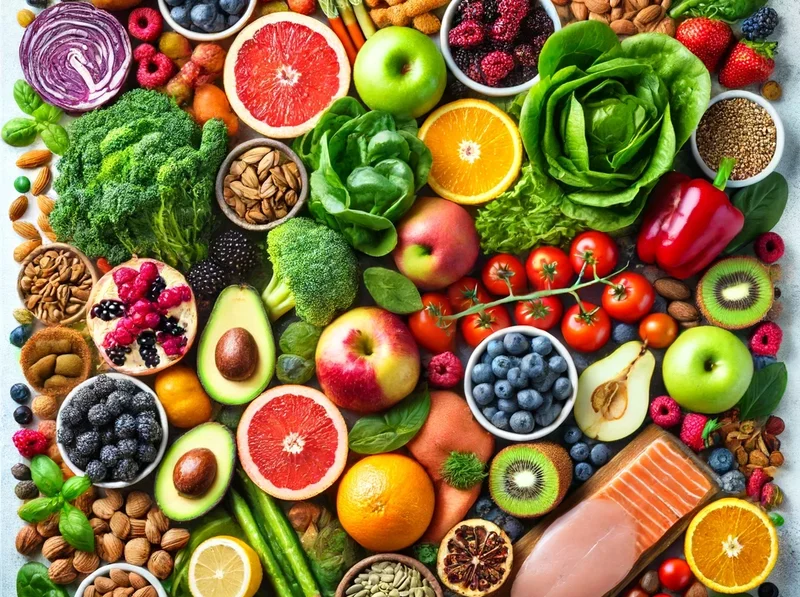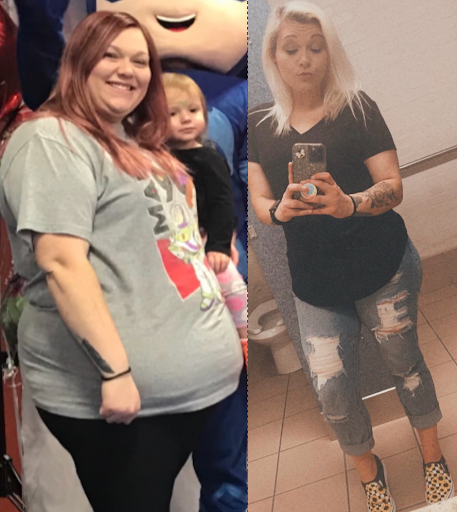In the quest for a healthier body, many seek ways to lose weight naturally without resorting to extreme diets or quick fixes.
This comprehensive guide aims to provide scientifically-backed tips for natural weight loss, emphasizing safe, sustainable methods.
With a focus on dietary changes, lifestyle modifications, and mindful practices, you can achieve your weight loss goals in a healthy and effective manner.

Natural Weight Loss Methods
Dietary Changes
Add Protein to Your Diet
Protein intake is crucial for boosting metabolism and reducing appetite.
Incorporating more protein into your diet can help you feel fuller longer and reduce overall calorie intake. Here are some high-protein foods to include:
- Fish
- Beans
- Lentils
- Poultry
- Tofu
Protein has a higher thermic effect of food (TEF) compared to fats and carbohydrates, meaning it requires more energy for digestion and absorption.
This can help increase your metabolism temporarily after meals. Moreover, protein can influence several appetite hormones such as ghrelin and GLP-1, which help regulate hunger and fullness.
Prioritize Whole, Single-Ingredient Foods
Whole foods are minimally processed and retain their natural nutrients.
Focusing on whole, single-ingredient foods ensures you're consuming nutrient-dense options that support weight loss.
Examples of such foods include:
- Fresh fruits and vegetables
- Whole grains like quinoa, oats, and brown rice
- Nuts and seeds
- Lean meats and fish
These foods are naturally lower in calories and higher in essential nutrients, helping you maintain a balanced diet and avoid overeating.
Limit Processed Foods
Processed foods are often high in added sugars, unhealthy fats, and refined carbs. Reducing your intake of processed foods can significantly improve your health and aid in weight loss.
Common processed foods to avoid include:
- Packaged snacks and candies
- Fast food
- Sugary cereals
- Soda and sugary drinks
By cutting back on processed foods, you can lower your calorie intake and avoid the empty calories that contribute to weight gain.
Stock Up on Nutritious Foods and Snacks
Keeping healthy snacks on hand can prevent you from reaching for unhealthy options. Some great choices include:
- Nuts
- Fruits
- Vegetables
- Low-fat yogurt
These snacks are not only nutrient-dense but also help you stay full between meals, reducing the temptation to indulge in unhealthy snacks.
Reduce Sugar Intake
Added sugars contribute to weight gain and various health issues.
Opt for natural sweeteners like honey and minimize your consumption of sugary drinks and snacks.
Here are some ways to reduce sugar intake:
- Choose unsweetened beverages
- Read food labels to avoid hidden sugars
- Use fruit to sweeten meals and snacks
Drink Water
Staying hydrated is essential for metabolism and can help reduce hunger.
Aim to drink at least 8 glasses of water a day.
Drinking water before meals can also help you feel fuller, reducing your overall calorie intake.

Drink Coffee and Tea
Unsweetened coffee and green tea can boost your metabolism and help you feel more energized.
These beverages also contain antioxidants that support overall health.
Green tea, in particular, contains catechins, which can enhance fat burning and improve metabolic rate.
Meal Timing and Portion Control
Eat a Healthy, Heavy Breakfast
Starting your day with a high-protein breakfast can help you feel full and reduce calorie intake throughout the day. Examples include eggs, Greek yogurt, and whole-grain toast.
Studies show that eating a substantial breakfast can help control appetite and reduce the urge to snack on high-calorie foods later in the day.
Eat More Fruits and Vegetables
Fruits and vegetables are low in calories but high in vitamins, minerals, and fiber.
Incorporating more of these foods into your diet can help you achieve a healthy weight.
Fiber, in particular, helps to promote satiety and reduce overall calorie consumption.
Use Smaller Plates
Using smaller plates can help with portion control and prevent overeating.
This simple trick can make a significant difference in your overall calorie intake.
Research suggests that people tend to eat less when they use smaller plates due to the perception of larger portions.
Eat Slowly
Eating slowly allows your body to recognize when you're full, reducing the likelihood of overeating.
Mindful eating practices can enhance this effect by helping you savor your food and pay attention to hunger cues.
Specific Diets and Fasting
Try a Low-Carb Diet
Low-carb diets can help reduce insulin levels and promote weight loss.
Focus on whole grains, lean proteins, and healthy fats while limiting refined carbs.
Studies have shown that low-carb diets can lead to greater weight loss and better health outcomes compared to low-fat diets.
Intermittent Fasting
Intermittent fasting involves cycling between periods of eating and fasting.
This method can help reduce calorie intake and improve metabolic health.
Common approaches include the 16/8 method, where you fast for 16 hours and eat during an 8-hour window, or the 5:2 method, where you eat normally for five days and restrict calories for two days.
MyPlate Diet Plan
The USDA's MyPlate model promotes balanced eating by including a variety of food groups.
This approach ensures you get all the necessary nutrients while managing your weight.
The MyPlate plan recommends:
- Filling half your plate with fruits and vegetables
- Including whole grains
- Choosing lean proteins
- Adding dairy or dairy alternatives
Healthy Cooking and Eating Habits
Spice Up Your Meals
Adding spices like cayenne pepper to your meals can boost your metabolism and add flavor without extra calories.
Spices can also reduce appetite and increase feelings of fullness.
Add Eggs to Your Diet
Eggs are a great source of protein and other essential nutrients.
They can help you feel full and support muscle growth.
Studies have shown that eating eggs for breakfast can lead to significant weight loss compared to a carbohydrate-rich meal.
Use Apple Cider Vinegar as Salad Dressing
Apple cider vinegar has metabolism-boosting properties and can help control blood sugar levels.
It makes a great addition to salads and can enhance the flavor of your dishes.
Replace Sugar with Honey
Honey is a natural sweetener that can be used in place of sugar.
It provides some additional nutrients and can help reduce overall sugar intake.
Steam, Grill, or Air Fry Foods
Using healthier cooking methods like steaming, grilling, or air frying can reduce the amount of oil needed, making your meals lower in calories.
These methods also help preserve the nutrients in your food.

Lifestyle Changes
Exercise and Physical Activity
Do Some Sort of Cardio
Cardiovascular exercise, such as running, swimming, or cycling, is effective for burning calories and improving heart health.
Aim for at least 150 minutes of moderate-intensity cardio each week.
Add Resistance Exercises
Strength training helps build muscle, which can increase your metabolic rate.
Incorporate weights or resistance bands into your workout routine.
Muscle tissue burns more calories at rest compared to fat tissue, helping you maintain weight loss in the long term.
High-Intensity Interval Training (HIIT)
HIIT involves short bursts of intense exercise followed by rest periods.
This type of training is very effective for fat loss.
HIIT can help you burn more calories in a shorter amount of time compared to traditional cardio exercises.
Dance as Exercise
Dancing is a fun way to burn calories and stay active.
Join a dance class or just dance at home to your favorite music.
It's a great way to improve your cardiovascular health and coordination.
Be Constantly Active
Incorporate more physical activity into your daily routine.
Take the stairs, walk or cycle instead of driving, and find opportunities to move more throughout the day.
Using a pedometer or fitness tracker can help you stay motivated and track your activity levels.

Mindfulness and Mental Health
Practice Mindful Eating
Mindful eating involves paying attention to what and how you eat, helping you enjoy your food and recognize fullness cues.
This practice can prevent overeating and promote a healthier relationship with food.
Overcome Food Addiction
Addressing unhealthy food cravings and emotional eating can help you make better dietary choices.
Seek support if needed to overcome food addiction. Identifying triggers and finding healthier ways to cope with emotions can be beneficial.
Get Quality Sleep
Sleep quality is crucial for overall health and weight management.
Aim for 7-9 hours of sleep per night to support your body's functions. Poor sleep can disrupt appetite hormones and increase cravings for high-calorie foods.

Reduce Stress through Meditation or Yoga
Stress management is vital for maintaining a healthy weight.
Practices like meditation and yoga can help reduce stress and improve mental well-being.
Chronic stress can lead to weight gain by increasing levels of the hormone cortisol, which can promote fat storage, particularly around the abdomen.
Supplements and Hydration
Supplement with Glucomannan
Glucomannan is a dietary fiber that can help with appetite control and weight loss.
It's found in the root of the konjac plant and can absorb water in the stomach, promoting a feeling of fullness.
Drink Lemon Water
Lemon water can aid digestion and support fat absorption.
It's a refreshing way to stay hydrated and add some flavor to your water.
The citric acid in lemons can also help detoxify your liver, enhancing your body's ability to metabolize fat.
Use Whey Protein
Whey protein supplements can help increase lean muscle mass and reduce body fat.
They are especially useful for those who engage in regular exercise.
Whey protein can also help reduce appetite and promote muscle recovery after workouts.
Drink Herbal Teas
Herbal teas, such as green tea and chamomile, can boost metabolism and promote relaxation.
Green tea contains antioxidants called catechins, which can help burn fat and improve metabolic rate.
Social and Behavioral Changes
Form a Group of Friends with Similar Goals
Having a support system can keep you motivated and accountable. Join a group or find a weight loss buddy to share your journey.
Social support can provide encouragement, share tips, and celebrate achievements together.
Set Achievable Goals
Setting realistic and measurable goals can help you stay on track and feel accomplished as you progress.
Break down your goals into smaller, manageable steps and celebrate each milestone.
Monitor Progress
Regularly tracking your weight and other health metrics can help you stay motivated and make necessary adjustments to your plan.
Keeping a food diary or using an app to log your meals and activities can provide valuable insights.
Conclusion
Achieving and maintaining a healthy weight involves making sustainable lifestyle changes rather than relying on quick fixes.
By focusing on a balanced diet, regular exercise, and mindful practices, you can naturally lose weight and improve your overall health.
Remember to consult with healthcare professionals for personalized advice and support throughout your journey.
Frequently asked questions
How to lose 20 pounds naturally?
Losing 20 pounds naturally involves combining a healthy diet with regular exercise and mindful eating practices.
Focus on whole foods, reduce sugar intake, and incorporate both cardio and strength training into your routine.
How can I lose 20 pounds in a month?
Rapid weight loss should be approached with caution. Aim for a balanced diet, consistent exercise, and proper hydration.
Consider consulting with a healthcare professional to ensure your plan is safe and effective.
How to lose 10 pounds in 10 days naturally?
While it’s challenging to lose 10 pounds in 10 days safely, focusing on a high-protein, low-carb diet, increasing physical activity, and staying hydrated can help jumpstart your weight loss journey.
By incorporating these scientific weight loss techniques into your daily life, you can achieve sustainable and healthy weight loss. Focus on making gradual changes and building habits that support your long-term health goals.
Bedtime ritual torches belly fat
Every night after she puts her kids to bed. Liz sits in her rocking chair and sips a warm drink. She needs the extra energy, after all…
She's raising three kids on her own. She always puts their needs before hers…
And before she knew it…
She stepped on the scale and saw that horrifying number staring back at her…290lbs.
That was the moment things HAD to change. So she started making this purple drink…That a friend shared with her...
Because it's packed with catechins.
Catechins are a rare plant compound that specifically target the "jiggly" fat around your belly, hips and thighs.
Not only is her belly completely gone… She lost over 100 pounds and 10 jean sizes.
Here's exactly what she did:






Add comment
Comments